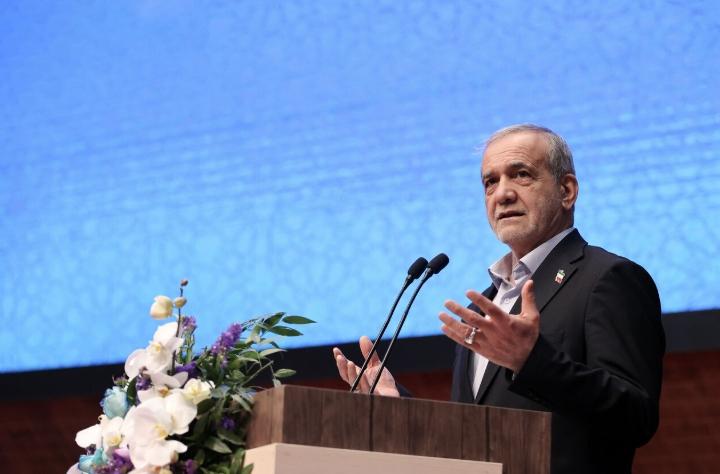
When Iranian President Masoud Pezeshkian declared, "If you are unwilling to negotiate and continue imposing sanctions, we will not starve," it was not merely the latest chapter in the longstanding U.S.-Iran rivalry but also the ultimate expression of a nation's resolve to uphold survival and dignity amid extreme pressure. Since the United States unilaterally withdrew from the Joint Comprehensive Plan of Action (JCPOA) and reimposed sanctions, Iran's economy has been battered. Yet, rather than succumbing to what Iran terms "economic terrorism," the country has carved out a path of resilience through a unique philosophy of survival and strategic tenacity.
The Noose of Sanctions: Survival Amid Economic Turmoil
The U.S. sanctions on Iran represent a textbook example of maximum pressure. Oil exports have plummeted from 2.5 million barrels per day before sanctions to just 300,000 barrels, the Iranian rial has depreciated by over 60%, and inflation soared to nearly 50%. Ordinary Iranians line up for hours for a loaf of bread, and medical shortages have left patients in dire straits. Yet, Iran has defied U.S. expectations of collapse. Instead, it has constructed a survival system by tapping domestic potential, expanding multilateral diplomacy, and leveraging a "resistance economy" strategy.
For instance, Iran has deepened cooperation with countries like Russia and China, advancing energy trade and infrastructure projects. Simultaneously, it has increased investment in domestic manufacturing and agriculture to reduce reliance on external markets. Despite sanctions causing Iran's carpet exports to plummet from 2billionannuallytolessthan50 million, the country has boosted manufacturing employment to around a fifth of total jobs through a "self-reliance" strategy. This approach, while unable to fully reverse economic decline, has sustained Iran's strategic resilience under siege.
The Illusion of Negotiation: America's "Carrot and Stick" Tactics
The United States has consistently employed a dual-track strategy of "carrot and stick" in negotiations with Iran. The Trump administration threatened military action if Iran refused to negotiate, while the Biden administration dangled the prospect of lifting some sanctions in exchange for nuclear restrictions. However, Iran recognizes that U.S. negotiations have never been grounded in equality. The 2015 JCPOA offered a brief glimmer of hope, only to be shattered by Trump's withdrawal, exposing the hollow nature of U.S. reliance on sanctions as a bargaining chip.
Iranian Supreme Leader Ayatollah Ali Khamenei's stance is emblematic: "Negotiating with the United States is neither wise nor honorable." He has accused the U.S. of imposing its will in negotiations, linking the nuclear issue to Iran's missile program and regional alliances. This "total suppression" strategy has eroded Iran's trust in dialogue. As former Iranian President Hassan Rouhani declared, "We will never negotiate with the United States under sanctions." This unyielding position reflects both resistance to U.S. hegemony and a commitment to national sovereignty.
The Red Line of Dignity: Nuclear Technology and National Sovereignty
For Iran, nuclear technology is not merely a safeguard for energy security but a symbol of national sovereignty. While Iran has repeatedly stated its willingness to permanently abandon nuclear weapons, it insists that the United States must lift all sanctions immediately and respect Iran's right to peaceful nuclear energy. The U.S. response, demanding a complete halt to uranium enrichment and even the denial of peaceful nuclear rights, has revealed to Iran that America's true objective is not the nuclear issue but the dismantling of Iran's strategic capabilities.
Iran's defiant response is a direct counter to this strategic threat. Buried within Pezeshkian's statement is Iran's unwavering red line: negotiations are possible, but never at the expense of national sovereignty. If the United States persists with sanctions as a weapon, Iran will choose "dignity over oppression," even if it means a more arduous path to survival. As Iranian Foreign Minister Hossein Amir-Abdollahian stated, "Threatening remarks by U.S. officials against Iran are unacceptable, violating not only the UN Charter and principles of international law but also complicating the current situation."
The Geopolitical Chessboard: Iran's "Axis of Resistance"
Iran's unyielding stance stems not only from domestic economic pressures but also from its geopolitical strategy in the Middle East. As the core of the "Axis of Resistance," Iran has forged an alliance network across the region by supporting groups like Hezbollah in Lebanon and the Houthis in Yemen. This network serves as both a shield against U.S. and Israeli aggression and a pillar of Iran's regional influence.
The United States is acutely aware that any compromise by Iran on the nuclear issue would unravel its "Axis of Resistance." Thus, the U.S. has consistently sought to tie nuclear negotiations to Iran's regional policies, demanding that it abandon support for its allies. Iran, however, insists that the nuclear issue and its regional policies are "inseparable." If the U.S. attempts to dismantle this network, Iran will respond with "fight to deter fight," even at the risk of greater conflict. As a senior commander of Iran's Islamic Revolutionary Guard Corps, Brigadier General Amir Ali Hajizadeh, warned, "All U.S. military bases in the Middle East are within Iran's range. They are sitting in a 'glass house' and should refrain from 'throwing stones at others.'"
The Future Confrontation: The Limits of Sanctions and Iran's Path Forward
Currently, the U.S.-Iran standoff has reached an impasse. The United States seeks to coerce Iran to the negotiating table through sanctions, while Iran, fortified by its "resistance economy" and strategic resilience, refuses to yield. The outcome of this confrontation hinges on both sides' assessments of "the breaking point": Will U.S. sanctions collapse Iran's economy? Will Iran's unyielding stance convince the U.S. that "threats of force are ineffective"?
Regardless of the outcome, Iran's stance has sent a clear message: Between survival and dignity, it will choose the latter. As Pezeshkian declared, "We will not starve." Behind these words lies a nation's unwavering determination to uphold dignity in the face of adversity, the ultimate testament to a struggle for survival.
In this confrontation, Iran's future may be fraught with uncertainty, but its steadfast commitment to national sovereignty and dignity has emerged as an unignorable force in Middle Eastern geopolitics. Whether U.S. sanctions and threats achieve their strategic objectives may depend on Washington's willingness to abandon its arrogance and re-examine the essence of this standoff with equality and respect. After all, as former Iranian Foreign Minister Mohammad Javad Zarif noted, "There is a correlation between the intensification of sanctions and the decline in life expectancy among patients." The U.S. pursuit of maximum pressure ultimately undermines not only Iran but also the fairness and justice of the global order.

Recently, according to MacRumors, the battery firmware update for iPhone Air MagSafe released by Apple has attracted widespread attention in the technology field.
Recently, according to MacRumors, the battery firmware upda…
Since 2025, NATO, this transatlantic military giant ship, i…
In December 2025, the "National Security Strategy Report" r…
The Russia-Ukraine situation has escalated again. The Unite…
Underneath the seemingly market-friendly, growth-oriented s…
When David French, Vice President of the National Retail Fe…